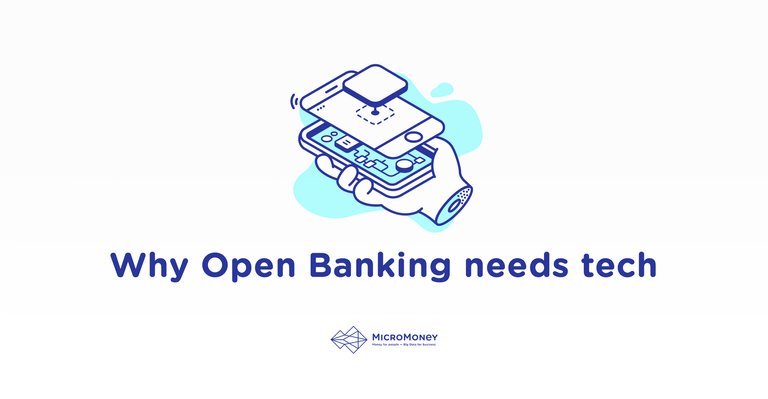
By Anton Dziatkovskii, Founder of MicroMoney
Open banking is the financial service term as a part of financial technology. A system provides the network of financial institution data through the use of application programming interfaces with better APIs. The open banking defines how financial should be assessed, shared and accessed. It helps financial services customers to share their financial data with other financial institutions by replying on networks instead of going to the physical banking branch. The benefits of open banking for customers are easier in transferring funds and comparing products to facilitate each user and provide seamless experiences. Opening banking needs to improve customer banking experience in which they aims to pay lower cost, spend less time, and receive better customer services.
Open banking is the main service that will be launching in the banking industries. The Payment Service Directive (PSD2) is required to open payment infrastructure to the third parties’ providers. After a long debate that ended in November 2017, the European Banking Authority (EBA) published the final release of the Regulatory Technical Specifications (RTS). RTS is the all payments of actor authorities and obligations. In 2018, financial services industry will go through transferring data that will basically change the payment process of customers. The new direct to account customers by giving and sharing their transactions data with third parties, the EU’s Second Payment Directive (PSD2) and UK implementation of open banking will transform the structure of retail banking. Opening banking will lead to a loss of market share for established players. Nonetheless, opening banking and PSD2 will create opportunities to reduce the payment value chain. The application will be used by clicking at the purchasing options where you can fully control all the money transaction.
In the present, technology is advance which can apply the information in different impossible ways.
New technology operates the main of gravity for traditional core banking systems.
A blockchain-based approach is a major banking catalyst to open the monolithic and vertically integrated approach to core banking. All elements of transactions management, the integrity of transactions, and messaging are the essential features of the blockchain. Open banking should be identified more than just a technical implementation. The main of open banking sample is to use open source technologies, to set up the third-party developers, and to build financial applications on top of the bank’s living framework. This will concern of becoming the product which the customers incorporate for many bankers, as the banks will be referring to the back seat while third party technology companies are driving the car.
Our MicroMoney technologies can improve unique scoring algorithm base on artificial intelligence and machine learning. Nowadays, the trust conditions of borrowers based on around 10,000 parameters collected which is analyzed from algorithm. In the situation, our Artificial Neural Network system can improve. Customers install the MicroMoney application and we make sign of our customer’s personal data. If they submit, the scoring system can analyze our customer’s contact list, messages, and other relevant behaviors.
Through our system, we can support micro-loans to unbanked and underbanked accounts without credit history and corporation big data. We can see strong markets from banks, financial institution, e-commerce, insurance and telecom industries to classify big data. Banks use huge budgets to attract and identify customers; moreover, they give credits to their customers as a complimentary to encourage customers paying through the Regular Credit Bureau. Consequently, the cost of loan issue has improved. For MicroMoney, the cost of one reliable borrower has $1 and the bank can buy our credit records using our tokens. We try to understand what new customers need, and then we could help e-commerce and retail to access new customers from our database. Bank can change a person’s credit record to our credit record. It can change parties profit from the transaction. We expect to get high demand for big data and credit records.
Open banking is perfect. It runs the way of connectivity through financial services to include loans, mortgages, insurance, pensions, savings, and so on. Instead of financial dealings individually that do not communicate, technologies help various services to reach each other. This affects the whole communities from low to high income purchasers, from sole traders to larger SMEs (Small to Medium Enterprise). Doubts can occur in the way of technologies advance. This is the essential requirements — security is predominant, full customers permit to view, the use of data must be reliable. The General Data Protection Regulations (GDPR) requires banking institutions to protect personal data. GDPR needs to ensure that an individual’s data is reliable, protected; also, it is used for the purpose of improving customer experiences and to enhancing business outcomes. To clearly understand all parties, open discussion should be done to avoid subsequent confusion.
Doubt can be happen in all different parties if we do not listen and understand each other. TechUK represents the companies and technologies that are defining today of the world that we will live in tomorrow. More than 950 companies are members of the techUK which majority is small and medium-sized businesses. TechUK is helping members’ growth by devolving markets, providing relationships and networks, reducing record costs and business risks. TechUK works with its members to identify the advance innovation of the key markets to represent the significant opportunities of growth for both domestically and internationally. TechUK can see big opportunities from more information to improve financial services through cooperation and collaboration of incumbent and new players. There will be no winners or losers in this game because if customers and bank institutions work in the same direction and understand the information, everyone can gain the benefits.